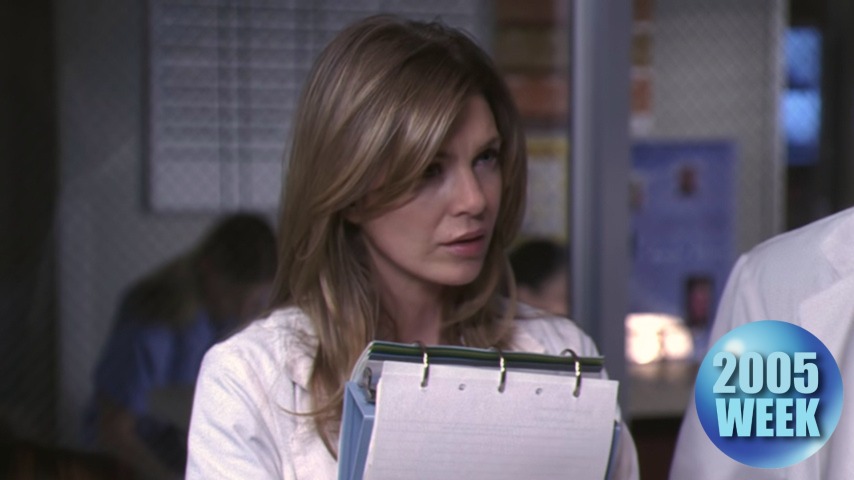"Pick me, choose me, love me:" How Grey's Anatomy found its voice
Twenty years back, the ABC phenom became the ultimate Emotional Catharsis Show.
Screenshot: Netflix/Grey's Anatomy
In an era when we’re increasingly expected to wait two years for 10 new episodes of television, it’s remarkable to think about how much network TV we used to get back in the day. In 2005, for instance, ABC aired not just the nine-episode first season of Grey’s Anatomy in the spring, but almost half of its 27-episode second season in the fall as well. In that way, Grey’s (which, yes, is still running to this day) is a show that both took a minute to find its feet and also one that emerged as an instant cultural phenomenon—all in one year.
Grey’s second season is filled with iconic moments that made it the watercooler show of the moment: the post-Super Bowl bomb episode with Christina Ricci and Kyle Chandler, the introduction of Eric Dane’s “McSteamy,” the devastating Denny Duquette arc featuring guest star Jeffrey Dean Morgan, and that infamous LVAD wire. But all of those storylines stand in the shadow of the first true signature Grey’s Anatomy installment, “Into You Like A Train” (season two, episode six), a.k.a. the one where two patients are impaled on the same pole and only one of them can survive.
Before that, the show’s evolution had come in fits and starts. Initially launched as a mid-season replacement for Boston Legal, the shortened first season of Grey’s Anatomy feels like a sexier, female-driven riff on ER. Though the pilot opens the morning after surgical intern Meredith Grey (Ellen Pompeo) and attending neurosurgeon Derek “McDreamy” Shepherd (Patrick Dempsey) hook up, there’s still a muted maturity to the overall tone. While the first season of Grey’s Anatomy indulged in playful comedy, sexy on-call room antics, and some heavy drama, it hadn’t yet found the acerbic sense of humor and unabashed melodrama that would soon become creator Shonda Rhimes’ signature.
In fact, the first season is downright wholesome at times, with Dempsey’s charming, carefree attitude lending the show’s central relationship a flirty, breezy vibe (and lacking the roller-coaster drama that would come to define it). The series debuted to high ratings, positive reviews, and several Emmy nominations. But it wouldn’t deliver its first truly iconic moment until the final few seconds of the season-one finale, as a glamorous redhead named Addison Montgomery (Kate Walsh) strides into the lobby of Seattle Grace Hospital, shakes hands with Meredith, and smiles, “You must be the woman who’s been screwing my husband.”
That spiky energy carries over into the start of season two, the defining and best one of the show’s run. (That said, season 12 was unexpectedly strong too.) The sophomore season introduced an after-hours bar hangout spot, Cristina Yang (Sandra Oh) calling Meredith “her person,” and more tense interpersonal dynamics at the hospital, particularly between Meredith, Derek, and Addison—the wife who cheated on him but now wants him back. And that all culminates in the fifth and sixth episodes, where Meredith famously begs an indecisive Derek to “pick me, choose me, love me” only to see her doomed side of the love triangle echoed in the impaled patient who gets sacrificed so the other can live.
Interestingly, the show had originally planned to end season one with the “pick me” cliff-hanger, but shifted to a shorter debut season to align with the Desperate Housewives finale schedule instead. Production held back four episodes that had already been shot for season one to air as the start of season two instead—rounding them out with some reshot material as well as a brand-new second episode. And Addison’s arrival became the makeshift season-one cliffhanger instead. So part of the reason Meredith’s speech and the subsequent impalement episode feel so memorable is because they were written to be a season finale and premiere, respectively.
Pompeo hated performing the “pick me” line and at various points over the years (including in this most recent season finale), Grey’s has tried to refute it by having female characters “choose themselves.” But in context, it’s an undeniably great bit of rom-com writing from Rhimes, up there with the “I’m just a girl, standing it front of a boy” speech from Notting Hill or the New Year’s Eve one from When Harry Met Sally. It’s also beautifully performed by Pompeo, who gives Meredith such a sardonic, aloof baseline that it hits harder when she gives over into full openhearted vulnerability.
Plus, one of the great things about a show filled with so many women is that Meredith doesn’t have to represent the entirety of the female experience. This is the same episode where Miranda Bailey (Chandra Wilson) happily skips off to a 10-year anniversary date with her husband; Meredith’s mom Ellis (Kate Burton) longingly recalls leaving her husband for a married man; Izzie Stevens (Katherine Heigl) bemoans not getting kissed on a first date; and Cristina takes things to a new level with her boyfriend with a casual, “Okay. We’re a couple. Whatever. Don’t make a big deal about it.”
 Keep scrolling for more great stories.
Keep scrolling for more great stories.
